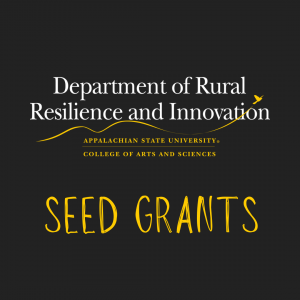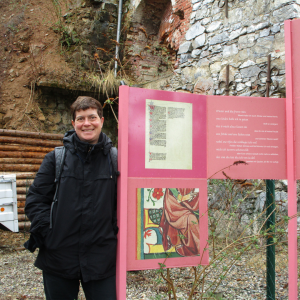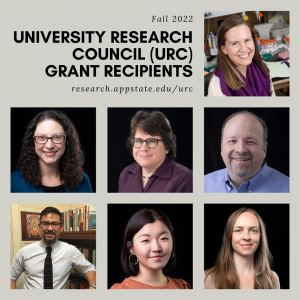RRI Seed Grant recipients share research outcomes
Jan 13, 2023
BOONE, N.C.
College News, Grants & Research, Faculty & StaffProfessor Alexandra Sterling-Hellenbrand awarded 2022–23 Fulbright to teach, conduct research in Austria
Jan 10, 2023
BOONE, N.C. — With support from her 2022–23 Fulbright, Appalachian State University’s Dr.
University News, Awards & Honors, Faculty & Staff, Grants & ResearchMeeting brings microbiologists across NC to App State
Jan 9, 2023
BOONE, N.C. — The North Carolina Branch of the American Society for Microbiology (NC-ASM) held its annual meeting at Appalachian State University on Saturday, November 5, at Leon Levine Hall. The meeting was the first in-person meeting in two years.
College News, Events, Grants & ResearchSAFE Student Spotlight: Sophia Ryan
Jan 2, 2023
Sophia Ryan, M.A. Geography
Student and Faculty Excellence (SAFE) Fund Recipient: Fall 2021
Project: “Greenspace and Mental Health: Adding Quality and Accessibility to Quantity"
SAFE Student Spotlight: Taylor Leonard
Dec 26, 2022
Taylor Leonard '22, M.A. Experimental Psychology
Student and Faculty Excellence (SAFE) Fund Recipient: Fall 2021
Project: “Dementia Worry: Does Public Stigma Predict People's Concerns About Developing Dementia?”
SAFE Student Spotlight: Rachel Fink
Dec 20, 2022
Rachel Fink '22, B.S. Psychology (Sustainability)
Student and Faculty Excellence (SAFE) Fund Recipient: Fall 2021
Project: “Morality of Environmental Attitudes: A Replication and Extension of Moral Roots of Environmental Attitudes”
University Research Council (URC) grant recipients
Dec 19, 2022
BOONE, N.C. — Congratulations to the following Appalachian State College of Arts and Sciences (CAS) faculty members on receiving Fall 2022 University Research Council (URC) grants!
University News, Faculty & Staff, Grants & ResearchDr. Marketa Zimova publishes two articles in "Biology Letters"
Dec 14, 2022
BOONE, N.C. — Congratulations to Dr.
Departmental News, Faculty & Staff, Grants & ResearchSAFE Student Spotlight: Samuel DeMay
Dec 13, 2022
Samuel DeMay, M.S. Engineering Physics (Automation and Instrumentation)
Student and Faculty Excellence (SAFE) Fund Recipient: Fall 2021
Project: “Update on the Ruby Phosphorescence Senior Lab: Cr3+ 2E Lifetime and 4T Absorption Studies”









